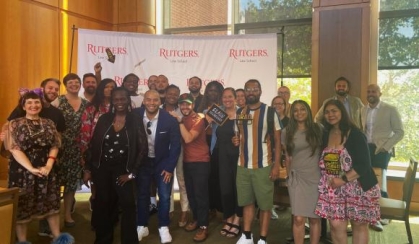Certificate in Cannabis Law and Business Program Wraps First Session

At the beginning of this year, a group of entrepreneurs and advocates convened for the first session of Rutgers Law School’s new Certificate in Cannabis Law and Business. Over the course of the six-month program, they learned about the rules and regulations impacting New Jersey’s cannabis industry as well as what it takes to fund, launch, and run a compliant cannabis business in the state. A core team of Rutgers instructors from across the law school and university was enhanced by more than 30 guest speakers including medical practitioners, compliance specialists, legislators, business owners, lobbyists, and advocates, all focused on charting the way forward for the emerging industry. By the conclusion of the program in July, 18 students earned their certificates and solidified their place within a growing network of cannabis professionals.
“I’m in awe of the students who took a chance on a brand new program and turned out week after week, put in the work, asked questions, and shared with each other,” says Vanessa Williams, assistant dean of new programs at Rutgers Law School. “I’m so proud and honored we had such a great cohort, and I can’t wait to celebrate their successes in the future.”
If you ask participant Joshua Perez, an entrepreneur planning to open a cannabis dispensary in Bergen County, the extensive syllabus wasn’t the only valuable component of the program.
“In addition to a well-rounded program in business and law, the networking opportunities afforded by this course have been invaluable,” he says. “It’s important to create these relationships because it’s nearly impossible to move forward in this industry if you go it alone.”
For Jannina Barros Oblitas ’07, participating in the program also opened her eyes to a potential new career path. She enrolled in the course with the hope of opening her own cultivation business; however, she has since shifted her focus to social equity advocacy.
“My capstone project for the course evaluated New Jersey’s ‘clean slate’ laws, which were designed to expunge cannabis-related offenses in light of legalization, and how these laws are working or not working for residents,” she says. “While the state has kept its promise to decriminalize cannabis usage and expunge related offenses, the onus is still on the individual to navigate an intimidating, complex, and often retraumatizing process. Certainly, more can be done.” To that end, Oblitas plans to get involved in the fight for social equity via outreach, education, and pro bono legal work to help connect individuals with the resources they need.
“To see the students’ progress has been the most amazing part,” adds course instructor Chirali Patel, attorney, advocate, and founder of Blaze Law Firm. “The transformations I’ve seen are a testament to their hard work throughout the program.”
According to Williams, the cohorts formed in these sessions will continue to meet on an annual basis to maintain their strong connection and build new ones with upcoming certificate holders. Registration is currently open for the next offering of this program, set to begin October 14, 2023.